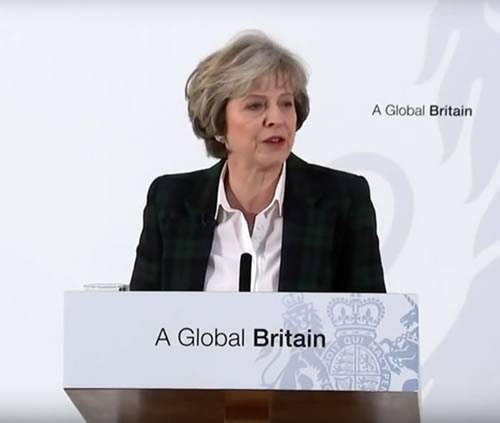Theresa May Announces That the UK Will Leave the Single Market – The Markets' Reactions
Stock-Markets / BrExit Jan 25, 2017 - 06:06 PM GMTBy: Submissions
 UK Prime Minister Theresa May announced, in a divisive speech, that the terms of the 'Brexit' voted for in the UK referendum last summer were to include leaving the single market. This would mean that the UK will negotiate new trade deals with the single market, as other non-EU countries do, and that the freedoms that exist within the single market (such as free movement of goods and people), as well as its regulations, will no longer apply to Britain.
UK Prime Minister Theresa May announced, in a divisive speech, that the terms of the 'Brexit' voted for in the UK referendum last summer were to include leaving the single market. This would mean that the UK will negotiate new trade deals with the single market, as other non-EU countries do, and that the freedoms that exist within the single market (such as free movement of goods and people), as well as its regulations, will no longer apply to Britain.

While news of a 'hard Brexit' has disappointed some people on both the leave and remain sides, others believe that this would have been the only deal open to the UK anyway, or that it is a step forward that there is now a firm plan for how Brexit will actually be carried out. But how have the markets responded to May's speech?
British Pound Sterling Sees Immediate Rise
As May began making her long anticipated speech the effects on the markets became clear almost immediately as the pound began to rise. It actually enjoyed its highest rise in a day since October 2008, long before the Brexit issue became a reality.
Market experts speculated that the reasoning behind this was not so much that the content of the speech and the idea of the UK leaving the single market was more appealing to currency investors, but rather the fact that the speech was the first indication that there was now a coherent game plan for how Brexit would be put into effect.
Theresa May's speech put an end to months of speculation about what Britain's status in relation to the single market might be, and uncertainty about whether the government in the UK would be able to agree on a firm plan after the shock leave vote and the resignation of David Cameron. If there's one thing the markets seem to hate more than anything, it is vagueness and uncertainty, because this makes putting your money into something like the pound inherently more risky than even a conventionally high risk investment.
FTSE 100 Suffers
It wasn't all good news, however. The strong pound in the wake of May's speech was accompanied by the biggest fall in the FTSE 100 share index since June, when Brexit was first voted for. The reasons for this, however, seem to be related not to the concepts discussed in May's speech, but to the surge in the pound, which had a negative impact on companies on the index who earn dollars. The dollar is under close scrutiny by forex watchers at the moment, as it remains to be seen how the early days of Trump's presidency will impact the currency.
The Future
These are certainly interesting times for the pound, especially in relation to both the euro and the dollar. As Britain begins its negotiations with the World Trade Organisation, and it becomes increasingly clear what kind of agreements the UK may benefit from as an entity outside of Europe, the markets are sure to be watching Sterling more closely than ever.
Should the UK be able to secure good deals with current trading partners within the EU, such as Germany, as well as finding favourable arrangements with the US and Asia, the pound may well begin to thrive again.
Disclaimer: This is an paid advertorial. This is a matter of opinion provided for general information purposes only and is not intended as investment advice. Information and analysis above are derived from sources and utilising methods believed to be reliable, but we cannot accept responsibility for any trading losses you may incur as a result of this analysis. Individuals should consult with their personal financial advisors before engaging in any investing and trading activities.
© 2005-2022 http://www.MarketOracle.co.uk - The Market Oracle is a FREE Daily Financial Markets Analysis & Forecasting online publication.



